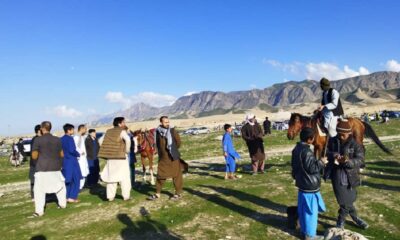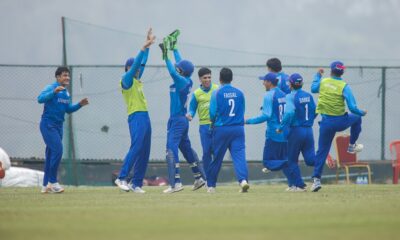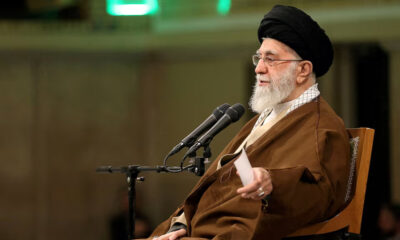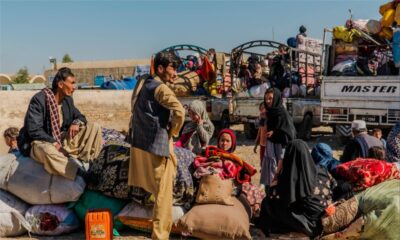Regional
Imran Khan appears in court as Pakistan braces for violence

Pakistan’s former Prime Minister Imran Khan appeared in court Wednesday, a day after he was dragged from another court and arrested in Islamabad, and his supporters clashed with police across the country.
A judge was asked to approve keeping the 70-year-old opposition leader in custody for up to 14 days.
Khan, who lost power last year but remains the country’s most popular opposition figure, is the seventh former prime minister to be arrested in Pakistan. His arrest deepened political turmoil and sparked violent demonstrations on Tuesday, Associated Press reported.
At least two people were killed in the overnight violence, one in the southwestern city of Quetta and the other in northwestern Pakistan, and dozens were wounded in various parts of the country.
In eastern Punjab province, where authorities said 157 police officers were injured in clashes with Khan supporters, the local government asked the army to step in and restore order.
Pakistan’s GEO television broadcast footage showing Khan appearing before a judge at a temporary court inside a police compound Wednesday. The former premier was seen seated in a chair, holding documents. He appeared calm but tired.
The judge is expected to rule on the request for a 14-day detention later in the day. Meanwhile, Khan’s legal team challenged his arrest before the Islamabad High Court, seeking his release.
Khan’s Pakistan Tehreek-e-Insaf party had called for demonstrators to remain peaceful, hours after mobs angered over the dramatic arrest set fire to the residence of a top army general in the eastern city of Lahore.
When he was arrested on Tuesday, Khan was appearing in court on multiple graft charges brought by Islamabad police. As he showed up in court, dozens of agents from the National Accountability Bureau backed by paramilitary troops stormed the courtroom, breaking windows after Khan’s guards refused to open the door.
Khan’s supporters attacked the military’s headquarters in the garrison city of Rawalpindi near the capital, Islamabad, but did not reach the main building housing the offices of army chief Gen. Asim Munir.
Other demonstrators tried to reach the prime minister’s residence in Lahore, but were driven off by baton-wielding police. Others attacked vehicles carrying troops and hit armed soldiers with sticks. So far, police and soldiers have not fired at protesters.
The military has not commented on the attacks on its facilities. None of the leaders from Khan’s party denounced the attacks on the military.
A police statement Wednesday said officers in eastern Punjab province arrested 945 Khan supporters since Tuesday — including Asad Umar, a senior leader from Khan’s party. Dozens of Khan supporters were also detained in Islamabad, Karachi, Peshawar and elsewhere.
Shah Mahmood Qureshi, senior vice president from Khan’s party, appealed for peaceful demonstrations Wednesday, urging followers: “Don’t damage public property, don’t attack offices, as we are peace lovers.” He said the party is considering challenging Khan’s arrest in the Supreme Court.
By morning, police said some 2,000 protesters still surrounded the fire-damaged residence in Lahore of Lt. Gen. Salman Fayyaz Ghani, a top regional commander. They chanted slogans at the military, including “Khan is our red line and you have crossed it.” Ghani and his family members were moved to a safer place when the mob on Tuesday first attacked their sprawling house.
Police deployed in force across the country, and placed shipping containers on a road leading to the sprawling police compound in Islamabad where Khan is being held and where he appeared before a judge at the temporary court placed there for security reasons, according to the government.
Amid violence, Pakistan’s telecommunication authority on Tuesday blocked social media, including Twitter. The government also suspended internet service in Islamabad and other cities. Classes at some private schools were canceled for Wednesday.
Rights group Amnesty International said it was alarmed by reports of Pakistani authorities blocking access to mobile internet networks and social media — Twitter, Facebook, and YouTube are suspended for a second day. Amnesty urged authorities to show restraint, saying clashes between law enforcement and Khan’s supporters risk human rights violations.
Regional
Iran wants indirect talks with US, warns regional countries over strikes against it
Trump has said he would prefer a deal over Iran’s nuclear programme to a military confrontation and he said on March 7 he had written to Khamenei to suggest talks.
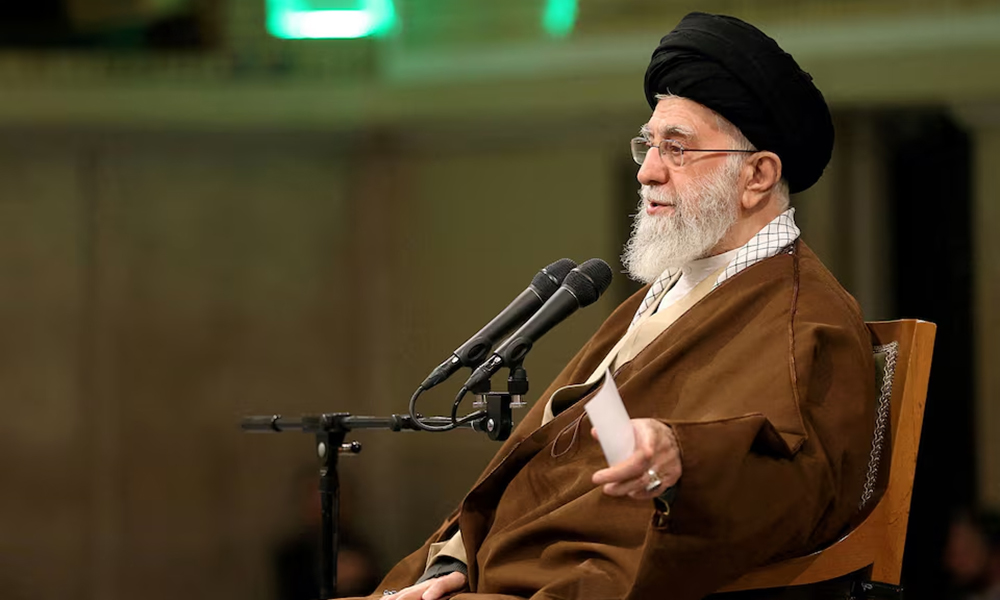
Iran is pushing back against U.S. demands that it directly negotiate over its nuclear programme or be bombed, warning neighbours that host U.S. bases that they could be in the firing line if involved, a senior Iranian official said.
Although Iran has rejected U.S. President Donald Trump’s demand for direct talks, it wants to continue indirect negotiations through Oman, a longtime channel for messages between the rival states, said the official, who spoke to Reuters on condition of anonymity.
“Indirect talks offer a chance to evaluate Washington’s seriousness about a political solution with Iran,” said the official.
Although that path could be “rocky”, such talks could begin soon if U.S. messaging supported it, the official said.
Iran has issued notices to Iraq, Kuwait, the United Arab Emirates, Qatar, Turkey and Bahrain that any support for a U.S. attack on Iran, including the use of their air space or territory by U.S. military during an attack, would be considered an act of hostility, the official said.
Such an act “will have severe consequences for them”, the official said, adding that Supreme Leader Ayatollah Ali Khamenei had placed Iran’s armed forces on high alert.
Warnings by Trump of military action against Iran have jangled already tense nerves across the region after open warfare in Gaza and Lebanon, military strikes on Yemen, a change of leadership in Syria and Israeli-Iranian exchanges of fire.
Worries of a wider regional conflagration have unsettled states around the Gulf, a body of water bordered on one side by Iran and on the other by U.S.-allied Arab monarchies that carries a significant proportion of global oil supplies.
Spokespeople for the governments of Iraq, Kuwait, the UAE, Qatar and Bahrain did not immediately respond to requests for comment. Turkey’s Foreign Ministry said it was not aware of a warning but that such messages could be conveyed by other channels.
On Wednesday, Iranian state media reported that Kuwait had reassured Iran that it would not accept any aggressive action being directed at other countries from its soil.
Iran’s ally Russia said on Thursday that U.S. threats of military strikes against the Islamic Republic were unacceptable and on Friday called for restraint.
Iran is trying to gain more support from Russia, but is sceptical about Moscow’s commitment to its ally, said a second Iranian official. This “depends on the dynamics” of the relationship between Trump and Russian President Vladimir Putin, the official said.
Trump has said he would prefer a deal over Iran’s nuclear programme to a military confrontation and he said on March 7 he had written to Khamenei to suggest talks.
The first Iranian official said a first round of indirect talks could involve Omani mediators shuttling between the Iranian and U.S. delegations. Khamenei has authorised Foreign Minister Abbas Araqchi or his deputy, Majid Takht-e Ravanchi, to attend any talks in Muscat.
Oman’s government spokesperson did not immediately respond to a request for comment.
However, the official believed there was a window of around two months to agree a deal, citing worries that Iran’s long-time foe Israel might launch its own attack if talks took longer, and that it could trigger a so-called “snap back” of all international sanctions on Iran to prevent the country from acquiring a nuclear weapon.
Iran has long denied wanting to develop a nuclear weapon. However, it is “dramatically” accelerating enrichment of uranium to up to 60% purity, close to the roughly 90% weapons-grade level, the U.N. nuclear watchdog has warned.
Western states say there is no need to enrich uranium to such a high level under any civilian program and that no other country has done so without producing nuclear bombs.
While Iran has said it will consider talks with the U.S. if the aim was to address concerns over its programme, it has rejected holding any direct negotiations when the U.S. is making threats and has said its missile programme would be off limits.
A senior Iranian military commander, the Islamic Revolutionary Guards Corps’ Amirali Hajizadeh, had implied on Monday that U.S. bases in the region could be targeted in any conflict.
In 2020, Iran targeted U.S. bases in Iraq after the assassination of Qassem Soleimani, the head of the IRGC’s Quds Force, in a U.S. missile strike in Baghdad.
Regional
Rains add to challenge for Myanmar quake relief, toll at 3,471
Aid agencies have warned the unseasonable rains and extreme heat could cause outbreaks of disease, including cholera, among quake survivors
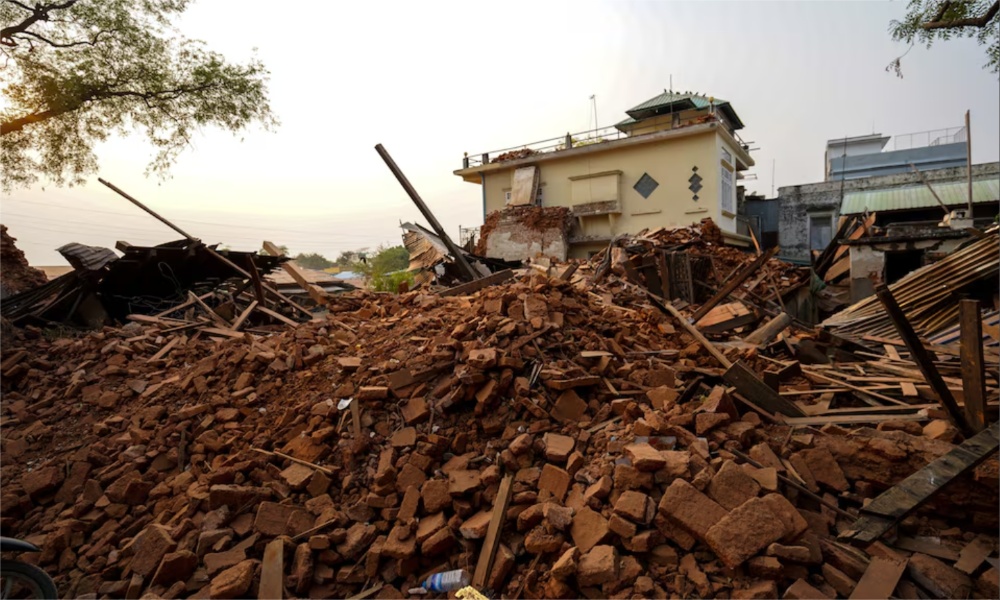
Rains fell on parts of earthquake-hit Myanmar over the weekend, which aid agencies said could complicate relief efforts and raise the risk of disease as the United Nations aid chief said more tents were needed to shelter those left homeless.
The death toll from the powerful quake that hit on March 28 rose to 3,471, state media reported, with 4,671 people injured and another 214 still missing.
Aid agencies have warned the combination of the unseasonable rains and extreme heat could cause outbreaks of disease, including cholera, among quake survivors who are camping in the open, Reuters reported.
“Families sleeping outside the ruins of their homes while bodies of loved ones are pulled from rubble. Real fear of more quakes,” visiting U.N. aid chief Tom Fletcher said in a post on X.
“We need to get tents and hope to survivors as they rebuild their shattered lives,” he said, adding strong, coordinated action was the key to saving as many lives as possible.
Myanmar’s neighbours, such as China, India and Southeast Asian nations, are among those that dispatched relief supplies and rescuers over the past week to aid the recovery effort in quake-hit areas that are home to about 28 million people.
The United States, which was until recently the world’s top humanitarian donor, has pledged at least $9 million to Myanmar to support earthquake-affected communities but current and former U.S. officials say the dismantling of its foreign aid programme has affected its response.
Three U.S. Agency for International Development workers who had travelled to Myanmar after the quake were told they were being let go, Marcia Wong, a former senior USAID official, told Reuters.
“This team is working incredibly hard, focused on getting humanitarian aid to those in need. To get news of your imminent termination – how can that not be demoralising?” Wong said.
In neighbouring Thailand, authorities said that the country’s death toll from the quake had risen to 24. Of those, 17 died at the site of a skyscraper in the capital, Bangkok, that collapsed while under construction. A further 77 were still missing there.
Myanmar’s military has struggled to run the country since overthrowing the government of Nobel laureate Aung San Suu Kyi in 2021, leaving the economy and basic services, including healthcare, in tatters, a situation exacerbated by the quake.
The civil war that followed has displaced more than 3 million people, with widespread food insecurity and more than a third of the population in need of humanitarian assistance, the U.N. says.
While a ceasefire was declared on Wednesday, the U.N. Office of the High Commissioner for Human Rights said on Friday the junta was restricting aid in areas that did not back its rule. It also said it was investigating reported attacks by the junta against opponents, including after the ceasefire.
Regional
Israeli troops expand ‘security zone’ in northern Gaza

Israeli troops were expanding their control of ground in northern Gaza, the military said on Friday, days after the government announced plans to seize large areas with an operation in the south.
Soldiers carrying out the operation in Shejaia, a suburb east of Gaza City in the north, were letting civilians out via organised routes, as troops moved in to expand the area defined by Israel as a security zone in Gaza, a statement said, Reuters reported.
Images circulating on social media showed an Israeli tank on Al Muntar hill in Shejaia, in a position that gave it clear sight over Gaza City and beyond to the shoreline. Shelling on the eastern side of Gaza was non-stop, a local health official said in a text message.
Where Israeli forces moved in, hundreds of residents had already left a day earlier, carrying belongings or loading them on to vans or donkey carts, after the military issued the latest in a series of evacuation warnings that now cover around a third of the Gaza Strip, according to the United Nations.
Israel resumed its operation in Gaza with a heavy series of air strikes on March 18 and sent troops back in after a two-month pause during which 38 hostages were returned in exchange for hundreds of Palestinian prisoners and detainees.
Efforts at restarting negotiations, brokered by Egypt and Qatar, have stalled. “There are currently no contacts,” a Palestinian official close to the mediation effort told Reuters.
Over the past two weeks, more than 280,000 people have been displaced in Gaza, according to U.N. humanitarian agency OCHA, adding to misery for families already repeatedly displaced over the past 18 months.
“I swear to God that I am staying in the street, there is no shelter here,” said 40-year-old Hemam Al-Rifi, who said members of his family were killed when the Gaza City school complex they were sheltering in was hit by a deadly strike on Thursday.
“My house was destroyed at first, and I stayed in a tent in a school, not a classroom, and now I don’t know where to go.”
In Gaza City, local people said Israeli strikes had hit a water desalination plant that was vital in providing clean drinking water. Aid supplies have been cut off for weeks.
On the southern edge of Gaza, Israeli troops have been consolidating around the ruins of the city of Rafah and the U.N. says 65% of the enclave is now within “no go” areas, under active displacement orders, or both.
Ministers have said the operation will continue until 59 hostages still held in Gaza are returned. Hamas says it will free them only under a deal that brings a permanent end to the war. On Friday, a spokesperson for the group’s armed wing said half of the hostages were being held in areas where people had been told to evacuate.
“If the enemy is concerned about the lives of these hostages, it must immediately negotiate their evacuation or release,” Abo Ubaida said in a message on Telegram.
HUNDREDS KILLED
Israel has not fully explained its long-term aim for the areas it is now seizing as a security zone, extending an existing buffer area along the edge of the enclave hundreds of metres into the Gaza Strip.
Gaza residents say they believe the aim is to permanently depopulate swathes of land, including some of Gaza’s last farmland and water infrastructure.
Officials say the operations are in line with plans of U.S. President Donald Trump, who said in February he wanted to move the Gaza population into neighbouring countries and turn the enclave into a waterfront resort under U.S. control. Israel says it would encourage Palestinians who wish to leave voluntarily.On Friday, Gaza health authorities said at least 35 Palestinians were killed, most in southern areas of Gaza. Among the dead were 19 members of one family killed when a strike demolished the three-storey building where they were staying.
The military said its forces killed Mohammed Awad, a senior commander in the militant group Palestinian Mujahideen, who it said was involved in the abduction of hostages including the Bibas family during the attack on Israel on Oct 7, 2023, and was most likely involved in their killing.
Israel accuses Hamas of hiding fighters in civilian buildings and says it takes precaution to limit casualties, but hundreds of Palestinians have been killed since the operation resumed, according to local health authorities. More than 250 of the dead were armed militants, the military says.
As a ceasefire agreement that halted fighting in January has collapsed, the risk of a wider return to war has increased, with Israel striking targets in both Lebanon and Syria over recent days. On Friday, it said an air strike in the Lebanese city of Sidon killed a senior Hamas operative.
Israeli troops have also been engaged in an extended operation in the occupied West Bank, where two Palestinians were killed on Friday.
The war began when Hamas fighters stormed into Israeli communities on October 7, 2023, killing 1,200 people and capturing more than 250 hostages, by Israeli tallies. Since then, Israel has reduced much of Gaza to ruins and killed more than 50,000 Palestinians, according to the enclave’s health authorities.
-

 Latest News4 days ago
Latest News4 days agoMinistry of Economy calls on US to release Afghanistan’s frozen funds
-

 Latest News4 days ago
Latest News4 days agoPakistan ‘extends’ deadline for a week for Afghans to leave the country
-

 World5 days ago
World5 days agoAs Iran tensions build, US military moves warplanes to reinforce Middle East
-

 Sport5 days ago
Sport5 days agoIPL 2025: Batters in race for prestigious Orange Cap
-
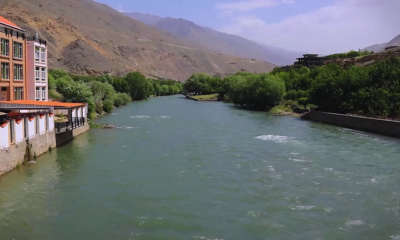
 Latest News4 days ago
Latest News4 days agoPanjshir to Kabul water conduit project ‘waiting for budget approval’
-
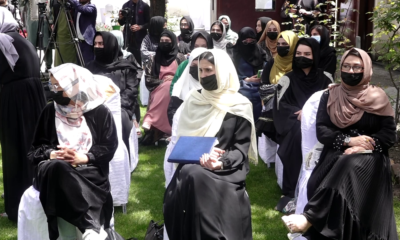
 Latest News4 days ago
Latest News4 days agoFemale journalists complain about lack of access to accurate and timely information
-

 Business4 days ago
Business4 days agoExports to Pakistan grind to a halt over faulty scanner at Torkham
-

 Regional4 days ago
Regional4 days agoMilitary confrontation seems inevitable if no new Iran nuclear deal, France says




